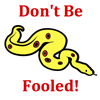
|
Virtual Images versus Real Images:
Images are seen in mirrors as the result of reflected light. The many light rays that originate at the object location reflect off the mirror and travel to each observer's eye. If the light rays diverge (spread apart) after reflection, then the image is referred to as a virtual image. If the light rays converge (come together) after reflection, then the image is referred to as a real image.
|

|
It is a common classroom demonstration (and sometimes even a student lab) to use a concave mirror to project the real image of an object onto a sheet of paper. Since real images are formed at locations where light is actually present, the image can be projected onto a sheet of paper at the real image location. Virtual images are formed behind mirrors where light does not actually reach. Placing a sheet of paper at the virtual image location will result in nothing phenomenal. Some students falsely believe that virtual images cannot be seen when looking at them in the mirror. But don't be fooled! You likely look at virtual images every day when you comb your hair in the plane mirror of the bathroom. Virtual images can be seen; they just cannot be projected onto a sheet of paper.
|